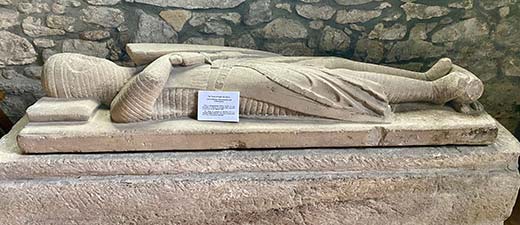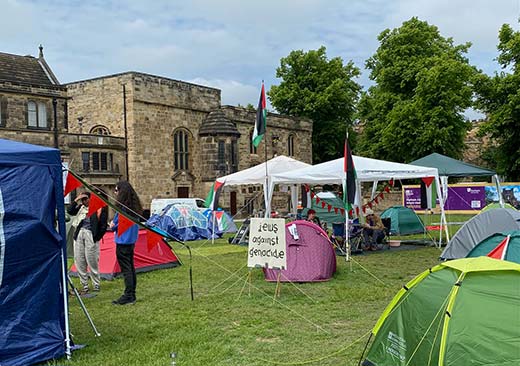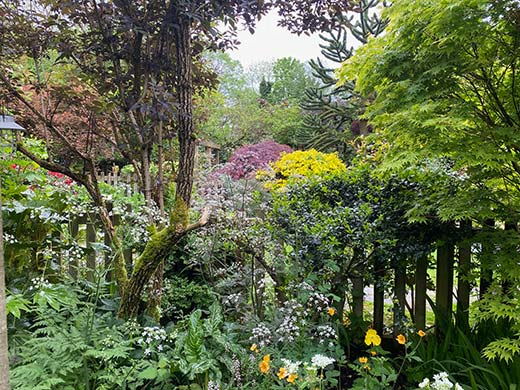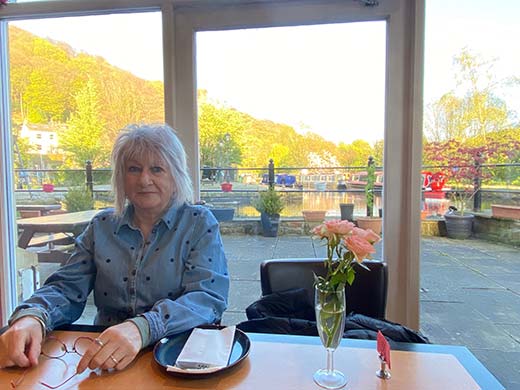
Fourth series, episode 10
All 142 episodes are available here on the HebWeb.
In the latest lore, there's the sun's rays and wet away days, castles and encampments, a garret and a garden, some strops about shops, conscripts and cafes, tough tykes v Romans and a magical musical spot.
Ne'er cast a clout
Last week, we went north on our May blossom tour. PW had carefully calculated the date of our departure and the hawthorn blossom buffed up obediently from milk to cream as the sun's rays shyly broke through the hurrying clouds when we got to Addingham.
Satnav Charlotte wanted us to turn off towards the A1, repeatedly ordering us to 'Return to the route! Return to the route!' But we ignored her and as she went for a vape to settle her nerves up there in her satellite, we happily wowed our way past Bolton Abbey.
At Burnsall we took a break at a café with a view of the river. As they worked, the owners, a cheery wife and sardonic hubby, provided decent homemade food and free entertainment, singing along, occasionally in tune, to a just audible homemade tape of 60s and 70s hits.
After which break, we drove on through high rise scenery, which featured the classic roadside combo of new may blossom and old limestone walls, with majestic trees coming into bud above and cow parsley and wild garlic below.
Along the way, we chose the limestone cottages and stout houses we'd like to own. I went for a classically proportioned manor house with a sweeping drive, and sheep and Lebanese cedars in its fields, and kindly suggested a nearby Dame House as being likely to please PW.
Nearing Richmond, large red flags were flapping on the army owned fields, and bold warnings advised us not to trespass, in case we were inadvertently shot. But I slowed slightly to admire the passing clusters of orange and dark green gorse bushes. The bushes might actually have been broom, a less prickly evergreen cousin of gorse, a bush that once caused Linnaeus to cry in admiration of its beauty, but as PW refused to hop over the wall to use my smartphone app, I drove on in a spirit of uncertainty.
We stayed at the Rose and Crown, in Romaldkirk, famous for its decent priced, high quality food. This year every room was occupied apart from one, so PW splashed invisible cash and bagged us a top floor suite.

In St Romald's Church, next door to the pub, an effigy of Lord Hugh Fitz Henry lies in a Transept. He died in Edward 1's Scottish war of 1305. The Fitz Henry s descended, according to the church leaflet, from the brother of Bodin, to whom the Conqueror granted Romaldkirk. The leaflet was written by a 20th century canon who noted that parts of the church were preconquest, although most of the Saxon church was destroyed by a Norman by the name of Malcolm Canmore, sometime before 1086, when the Normans were still busily laying waste to the North.
Next day we drove along skinny, tree shaded lanes past handsome Raby Castle and onto Durham City. While we waited for PW's cousin and husband to arrive we shopped. I admit, I'm not a patient shopper, and I only lasted a minute in Superdrug, because of the wretched wailing blasting from large speakers set up high. This racket was only interrupted by a shouty DJ, who gave plugs for the Superdrug products. Ear plugs were the plugs I would have liked, but I couldn't wait. I had to beat it as fast as I could into the charmless arcade.
At WH Smith, below the ancient Market Square, I wasted ten minutes trying to buy newspapers from a shop assistant who ignored his quickly extending queue of customers as he gave all his attention to fixing the broken self-service machine. The poor Japanese student ahead of me only wished to purchase a postcard showing the cathedral and castle and Oriental museum, but checkout guy didn't think to take our cash payments. So I left my newspapers on the counter and stomped off to the Tesco mini mart next door.
After buying paperbacks in blissfully quiet Waterstones, we met PW's cousin and husband outside the Cathedral, where a few dozen students sheltered in a plastic tent encampment, in protest against their ancient seat of learning accepting donations from Israeli sponsors.

The Clifford Castles
Homeward bound from our mini break, the heavens opened as we battled west through the lorry spray on the elevated A road to Westmoreland. It usually affords glorious views of the Lake District peaks, but that morning the ferocious precipitation blotted out such wonders. If the weather had been kinder we could have visited the remains of ruined castles at Brough, Brougham, Appleby and Pendragon which once belonged to a Lady Anne Clifford.
Anne's brothers having died at an early age, legal documents from the 14th century stipulated that surviving members of the Clifford family, of either sex, could succeed to the title. So Anne was the rightful heir. Despite which, her father, the heartless, misogynistic 3rd Earl, passed them on to his brother and his brother's sons.
It was only after the death without heir of Anne's cousin Henry that her claim to the Clifford estates was restored. At the end of the Civil War, by which time she was almost sixty years old, monarchist supporting Anne returned up North and spent the next thirty years restoring her castles. Job done, her Ladyship died in her 90s, but without an heir of her own, at her main home, Skipton Castle.
We pressed on past the unseen line of castle ruins and admired the sodden beauty of the just visible flanks of the surrounding hills, including swathes of bluebells and down in the valley admired resilient hawthorns, still in full bloom all along the Eden Valley, till we made our last stop at Kirkby Lonsdale. Unlike Hebden Bridge, this little town still had banks and a Brooks Supermarket on our last tour. This year the supermarket was still there, but we didn't check out the banks. Instead, we ducked out of the rain down a passage to a stylish Italian café, where, inspired by the spirit of George Melly, I asked the charming waitresses to turn the charmless music down, before checking this was ok with the other two customers, who hadn't thought to ask, but now enthusiastically supported us. Following which, we all had a much more relaxing experience, especially the staff. We peacefully finished our crosswords as we sipped our cappuccino and mocha.
Driving back through Settle, PW wanted to listen to Paula Vennells at the enquiry into the sub postmaster scandal, but instead we got fevered speculation from BBC commentators about a General Election! Back in Hebden Bridge, we turned on the telly just in time to see Rishi, 'the Wally without the brolly,' trying to talk over a loudspeaker blasting out Things can only get better.
An English country garden
Sometimes in May the sun came out.

Embrace disorder!
One morning, waking to the realisation that my writer's garret needed a spring clean, I reread Camilla Pang's adolescent response to her mother when she was asked to tidy the room in her dorm so that her mum could sit down. Young Camilla patiently explained to her mother that it was impossible to keep a perfectly tidy room due to the second law of thermodynamics. Why didn't I try that one when my books were strewed around in my tiny 1960s boxroom in the Port?
Pang was diagnosed with Autism Spectrum Disorder at the age of 8. But she gained an understanding of the world by applying her burgeoning knowledge of scientific theory. She knew at an early age that the second law of thermodynamics is the enemy of order, that it turns all our lives into a Sisyphean battle. To adolescent Camilla, her room was perfectly orderly, because she knew exactly where to find the books and journals she had scattered around her bed.
Ten years later, Dr Camilla Pang wrote in her prizewinning Explaining Humans (Penguin, 2020), ' … when a parent, partner or flatmate tries to make you change your ways and tidy up your things … they're pitting you against the fundamentals of thermodynamics. There's no point in tidying your room unless it's going to make you or someone else feel better.' We should embrace disorder as an inevitable part of our world, but that isn't the same as surrendering to it.
So I put Pang's book down on the floor, as my bedside table was groaning under the weight of Ted Hughes, Syvia Plath and Irish folk tales and decided I would definitely embark on a proper spring clean before May passes into June.
National service then and now
One of the blessings of old age is to enjoy detailed chats with other senior citizens about our maladies. But I'm at a disadvantage when I'm with PW, who has coped with five serious conditions in as many years, which makes my tenacity in coping with a painful corn on the middle toe of my right foot seem somehow less heroic. So I haven't revealed to relatives and friends that a bothersome callus has recently appeared on the edge of my right heel.
The truth is, tenderfoots like me have long been a target for mockery. Which is why I thought of Alfie Bass, who played the conscript Bootsy in ITV's The Army Game, back in the 1950s. Bootsy was also a martyr to his feet. In the show the army medics allowed him to wear thick socks and plimsolls instead of regulation boots. It was a random reminiscence, but blow me down, the following day conscripts were back in the news. Rishi Sunak had a plan! He was appealing to older voters by the age old tactic of picking on the young.
I remember walking home from primary school in 1957 with other lads in my class who told me that conscription had been abolished. We must have been all of 6 or 7 years old. So I've skim read histories reflecting on that time. It seems that conscription wasn't a hit with captains of industry back then, as it took a huge cohort of fit and able young men away from serving the needs of the economy. And as for captains in the forces, many complained that the need to train up a constant stream of conscripts through square bashing and drills was dull, repetitive and not 'real soldiering.' One volunteer, they often said, was worth ten conscripted men.
Looking at the figures, it seems that more than two million UK conscripts served in 'real soldiering' in overseas wars, and from Palestine, Kenya, Aden and Malaysia there were reports of conflicts and massacres, with conscripts fighting dark skinned natives, who for some unknown reason wanted their countries back.
Giving Rishi his due, if re-elected, it seems only 30,000 of 'the brightest and best' recruits would join his version of the conscript army. The rest of the new cohort of adults would provide cheap labour; 'compulsory volunteers' as former Labour Home Secretary Alan Johnson labelled it on the Laura Kuenssberg show. Which made me wonder what would happen to the teenagers in the future, who might have wanted to do voluntary work in their gap year?
Some more adventurous youths signed up for VSO. But I joined Community Service Volunteers in my gap year and worked at a massive psychiatric hospital in Greenock which looked like something from a horror film. Whilst my primary school class mate John Price, who had told me ten years before that he wanted to be a Squadron Leader in the RAF (I wanted to be a professional footballer), went into the RAF on leaving school, as a volunteer.
At a Christmas concert in the 1950s, I remember that John was Good King Wenceslas and I was the poor man gathering winter fuel. I also remember John's mum when she came to see him. She was dark haired, small, shy and quietly proud of her boy. John was indeed an impressive lad. He passed the 11 plus and at the grammar school he organised charity parties during half terms for children with special needs. One year he invited lads from the local Sec Mods in Ellesmere Port to come and help, and I went along with a mate. John was someone who made such things happen. So, I wasn't surprised when in 1969, he went straight from being Head Boy at the Grammar School into the RAF.
Keeping warm in a nurses' hostel during the snowy Scottish winter of 1970, I got a letter from a friend's mum. The envelope contained a scribbled note and a news clipping from The Ellesmere Port Pioneer. During a training exercise involving mid-air refuelling, John Price and his expensive jet plane were engulfed by jet fuel and flames. Details of the funeral were not enclosed.
Rim Nam Thai
Here's PW at Rim Nam Thai in Hebden, which is regularly packed out these days. Perhaps it's because of the gorgeous outlook onto the canals and beyond, or the attentive staff in traditional costumes and trainers, or the new menu with meals conjured up by the brilliant new Chef. We love sizzling Tigers Tears and Volcanic Roasted Duck, but we bet the gluten free, vegetarian and vegan offerings are just as scrumptious.

Readers write
Here's a further tale from the Colne Valley storyteller, and Shaggy Dog regular Norky (Peter Norcliffe).
I'm going to tell you a story about when Julius Cesar came to Yorkshire. I'll invite you to cast your mind back to 54 BC. I don't know what year Cesar thought it was, because his own calendar didn't appear until 46 BC and it was wrong, and Pope Gregory the chap who came up with the calendar that we use today wasn't born yet, and more importantly, it has to be said, neither was Jesus Christ. Whichever date he thought it was became what we now know as 54 BC.
Julius was feeling ambitious and decided to invade Britain, he gathered a large army together and after crossing the channel landed in Kent. As it was down south this invasion malarkey was no bother at all, the southerners basically ran away. It was the same when he went up through Wales, Derbyshire and Lancashire. The Lancastrians put up the best resistance - they whinged a bit. He was finding this invasion malarkey so easy he then thought that he was ready to tackle Yorkshire.
As he and his men came over the Pennines and were overlooking the beautiful valley of the River Colne, later to be known as the Colne Valley, as he was admiring the view a voice boomed out from a barn just off the side of the road, "Tha's no good comin' this way lad, thahs in Yorksha now thanose and thas in for a good idin."
Julius was not best pleased at this turn of events. He was not used to being told what to do, so he picked out his best five roughty toughty soldiers. Many history books actually tell us the names of these soldiers, they were I, II, III, IV and V. Julius barked out is orders to his men, "Go down to that barn and bring me the head of that dim-wit."
These five men marched into the barn and soon there was a right commotion, screaming, shouting, crashing and banging, followed by an eerie silence.
"Funny that," thought Julius. Climbing off his horse he went to have a look. All he found were his men lying dead on the floor and no-one else about. Julius was fair vexed by now but still determined. He carried on and was soon passing a cottage and that voice rang out again. "Tha's no good coming this way lad, thahs in Yorksha now tha nose and thas in for a good idin."
Julius was very vexed by now, so he picked out another 25 roughty toughty killers and again barked out orders for them to come back with that man's head on a plate. More screaming, shouting, crashing and banging, and then the same eerie silence. Again Julius found all his men lying dead on the floor, and again no-body else about. Even though Julius was beside himself with rage, he was even more determined.
A little further down t' road and into outskirts of Marsden, from the small wood just to the top side of the church, he heard that voice again: "Tha's no good coming this way lad, thahs in Yorksha now tha'nose and thas in for a good idin."
This time Julius was going to fix him once and for all. He picked out his best centurion and an hundred men and sent them into the wood to do the deed. After a few minutes of screaming, shouting, crashing and banging, the centurion staggered out from the edge of the wood, he was covered in blood and snot, his helmet was on back to front, but he just had enough strength to shout up to Julius:
"STOP, GO BACK, IT'S A TRAP, THERE'S TWO OF EM."
Opal comet's magical musical trip
I was walking home when first I heard and then saw this …
Murphy's Lore, the book, is available to order here
If you would like to send a message about this piece or suggest ideas, email George Murphy
More Murphy's Lore
See the Murphy's Lore home page for all 142 episodes.


